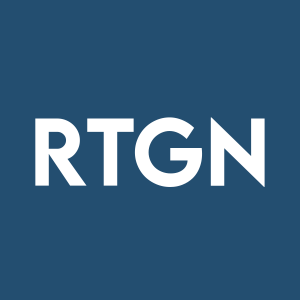RetinalGeniX™ Technologies Inc. Announces the Submission of Two Provisional Patent Applications For Investigational Therapeutic Drugs
Therapeutic Solutions Being Developed for Dry Age-Related Macular Degeneration and Alzheimer’s Syndrome
PETALUMA, Calif., Nov. 09, 2023 (GLOBE NEWSWIRE) -- RetinalGeniX™ Technologies Inc. (OTCQB:RTGN) (“RetinalGeniX” or the “Company”), today announced that it has submitted two provisional patent applications to the US Patent Office for its investigational therapeutic drug candidates RTG-2023 and RTG-2024.
RTG-2023 is being developed to treat dry age-related macular degeneration (AMD). There are two forms of the disease; wet AMD and dry AMD. Wet macular degeneration is the leading cause of permanent central vision loss. Dry AMD can progress to the wet type if not monitored closely by a doctor.
Currently, there are no drugs approved by the FDA that can prevent the dry form of this eye disease from progressing to the wet form or treat the wet form, except through intraocular injections. These direct injections into the eyes are a heavy burden on the patient, both financially and emotionally, and must be administered monthly for the rest of their life.
A 2022 study displayed by the National Institutes of Health (NIH PubMed) stated that 200 million people worldwide are estimated to have AMD, and by 2040, this number is projected to rise to close to 300 million.
According to the Centers for Disease Control, in 2019, an estimated 19.8 million (
RTG-2024 is intended for the treatment of dementia, specifically Alzheimer’s syndrome.
According to Alzheimer's Disease International (“ADI”), there are over 55 million people worldwide living with dementia in 2020 and this number is expected to almost double every 20 years, reaching 78 million in 2030 and 139 million in 2050. ADI estimates there are over 10 million new cases of dementia each year worldwide, implying one new case every 3.2 seconds.
According to the Alzheimer's Association, 10 million Americans have some form of dementia with an estimated 6.7 million Americans age 65 and older living with Alzheimer's in 2023. In addition, the Alzheimer's Association has reported that the five drugs currently approved by the U.S. Food and Drug Administration (FDA) for the treatment of Alzheimer’s disease, donepezil, rivastigmine, galantamine, memantine, and memantine combined with donepezil, are aimed at improving symptoms and do not affect the underlying brain changes that cause symptoms, nor do they alter the course of the disease
Leading the RTG-2023 and RTG-2024 project are Fred Chasalow Ph.D., special consultant to RetinalGeniX, and Dr. Jerry Katzman, M.D. CEO of RetinalGeniX the co-developers of the Investigational New Drug Applications.
Dr. Katzman said, “The Investigational New Drug Application is a lengthy process, but it's a promising start. The Company’s novel approach includes the use of high-resolution retinal imaging and pharmacogenetic mapping to be combined with the promise of these investigational drugs. It’s a new approach to exploring potential therapies for these chronic systemic diseases.”
RetinalGeniX has contracted with Avania https://www.avaniaclinical.com/ to provide guidance on RetinalGeniX’s interactions with the FDA.
Contact
RetinalGeniX Technologies Inc. Jerry Katzman, MD, CEO
jkatzman@retinalgenix.com
+1 (415) 578-9761
www.retinalgenix.com
About RetinalGeniX™
RetinalGeniX is an ophthalmic research and development company focused on developing technologies for the early detection and treatment of ocular diseases as well as neurodegenerative, cardiovascular, vascular, metabolic, and diabetic conditions. RetinalGeniX through its DNA/RNA/GPS™ Pharmaco-Genetic Mapping™ software is developing laboratory protocols that will be accessible to patients in DNA RNA test kits or through an application that will generate test kit data providing bio-marker information to aid in drug development. Additionally, RetinalGeniX is developing a high-resolution retinal home monitoring system that will offer cost-effective 24/7 real-time alerts to both physicians and patients.
Safe Harbor Statement
This press release contains certain forward-looking statements within the meaning of the safe harbor provisions of the Private Securities Litigation Reform Act of 1995. These statements are identified by the use of the words “could,” “believe,” “anticipate,” “intend,” “estimate,” “expect,” “may,” “continue,” “predict,” “potential,” “project” and similar expressions that are intended to identify forward-looking statements and include statements regarding developing RTG-2023 to treat dry age-related macular degeneration, 200 million people worldwide having AMD, the number of people worldwide having AMD rising to close to 300 million by 2040, 19.8 million Americans aged 40 and older living with AMD, 1.49 million Americans living with the vision-threatening form of AMD, developing RTG-2024 to treat dementia and specifically Alzheimer’s syndrome, the number of people worldwide living with dementia almost doubling every 20 years, the number of people worldwide living with dementia reaching 78 million in 2030 and 139 million in 2050, there being over 10 million new cases of dementia each year worldwide, 6.7 million Americans age 65 and older living with Alzheimer's in 2023, using the Company’s DNA/RNA/GPS™ Pharmaco-Genetic Mapping™ software technology to develop laboratory protocols to aid in drug development and developing a high-resolution retinal home monitoring system that will offer cost effective 24/7 real-time alerts to both physicians and patients. These forward-looking statements are based on management’s expectations and assumptions as of the date of this press release and are subject to a number of risks and uncertainties, many of which are difficult to predict, that could cause actual results to differ materially from current expectations and assumptions from those set forth or implied by any forward-looking statements. Important factors that could cause actual results to differ materially from current expectations include, among others, the Company’s ability to successfully complete research and further development and commercialization of Company drug candidates, the timing, cost and uncertainty of obtaining regulatory approvals for the Company’s drug candidates, the Company’s ability to protect its intellectual property, and the risk factors described in the Company’s Annual Report on Form 10-K for the year ended December 31, 2022 and the Company’s subsequent filings with the SEC, including subsequent periodic reports on Forms 10-Q and 8-K. The information in this release is provided only as of the date of this release, and we undertake no obligation to update any forward-looking statements contained in this release on account of new information, future events, or otherwise, except as required by law.










